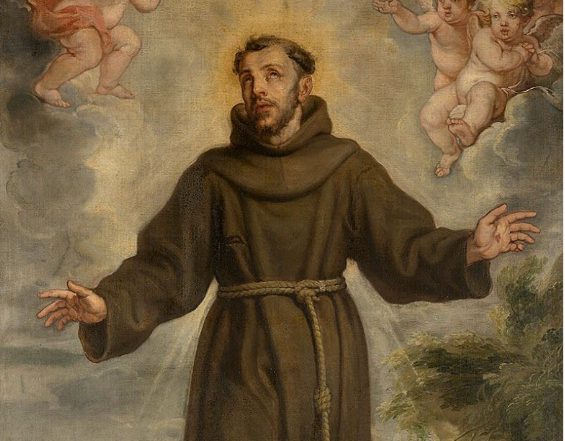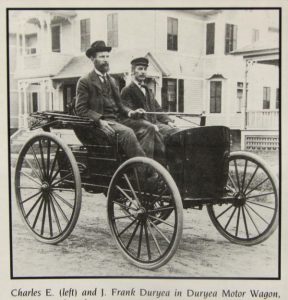Winner of the Spring 2019 StMU History Media Award for
Best Article in the Category of “People”
Francis was faced with a very large obstacle: while he was trying his hardest to pursue what he found to be his vocation, the hate that welled up in his father proved to be a major issue in his passage to that calling. Even though Francis knew without a doubt that he could easily become a very successful merchant, he felt an even stronger gravitation towards another life. Indeed, he felt called to a life that would constantly require to him to put the skills he gained from shadowing in his father’s work and provide him with an even stronger fulfillment in his life, despite it being very much against the social standards of his community and the wishes of his father. While his father saw his choice as an acceptance of failure, Francis saw it as an answer to the call of something greater than anyone could have ever imagined.
In Assisi, Italy, lived our character, Francis. Francis was born in 1182 to Pietro and Pica Bernardone. Throughout his childhood, Francis proved to be a very charming and popular young boy, as he was well liked by many children in his area, and was constantly followed by a group of friends. At home, Francis’ parents were very caring for him and constantly tended to all his wants and needs. His father was a very successful textile merchant, a career that made him and his family wealthy, while Francis’ mother stayed at home with him and did house work, including serving Francis, making him the center of her life, her pride and joy.1 Francis was well set with a large group of friends and two parents that loved to spoil him.2 When Francis was of age, he went to work with his father to learn the business of a merchant. Francis, as it turned out, was a natural, and caught on to the trade very well. After a short time, he began showing signs of a bright future as a textile merchant.
Merchants in Francis’ time were those that traveled long distances in order to exchange goods in various lands with various people. Textile merchants, the kind of merchant that Francis’ father was, tended to sell a great amount of goods and generally made very large amounts of revenue from their sales. Merchants were also well known for influencing the spread of culture and religion to those that they sold to, as they needed to be very persuasive in order to make sales, and were naturally found to do the same with their lifestyles. As a result, Francis quickly learned not only how to sell goods, but how to teach as well. The skill of spreading and teaching customs, language, and especially religion would greatly influence Francis’ future. His father had no idea that he was preparing his son for a future calling outside of textile trading.3
When Francis reached young adulthood, a war had sparked in his country, Assisi, and its neighboring city, Perugia. Francis was sent into the military to take part. On the battlefield, Francis observed firsthand the many horrors of battle, and was left with experiences that would haunt him for quite some time. Francis was not in a good mental state when he was sent home from his first tour, and sadly, he hardly had time to recover before he was sent to war a second time. The next time he came home, Francis’ behavior had taken a turn for the worst, as his memories had scarred him greatly. To attempt to rid himself of these scars, Francis tried to return to the life he had right before he first left home. In an attempt to adapt to civilian life, Francis ultimately found himself drinking heavily with his friends and was frequently surrounded by constant celebrations. In addition to his attempts to fuel his social life, he continued to live the life of good luxury in his home. All of his attempts, however, only numbed the pain for a very short time.4
Not long after returning to life in his town, Francis had fallen gravely ill. Eventually, when his state failed to improve, it seemed very likely that he would die from the illness that had caught hold of him. Francis was surrounded by distress and fear, and it seemed to him that there was nowhere to turn. With nowhere else to seek refuge, Francis began to turn towards his faith, which he had neglected through his life of luxury and celebration. He began to visit the local church daily to reflect and pray. He found a very strong devotion to Christ’s Passion, through the Stations of the Cross. This was a small conversion that would continue to influence Francis. After turning his face towards the church, Francis found himself healing from his great illness. In response, he began to devote more and more time to his spirituality within the church: he reflected daily on Christ’s Passion through the Stations of the Cross. His illness quickly forgotten, Christianity became the most important matter in Francis’ life. Unbeknownst to his community or himself, Francis was changing.5
His parents were the first to see the changes that Francis was going through, though they knew not what was going on in his life. All they noticed was that his mood, all of a sudden, had become withdrawn from others. After a while, they noticed that Francis was acting out of the ordinary, very unlike what they had always known him to be. Then, all together, without any warning, Francis simply left. Francis’ parents had no idea where he had gone or what he was up to.6
Francis had left his old life behind and began a new one. He took a vow of poverty. He no longer held a longing to have many material possessions or a large accumulation of wealth, things he was raised with. Instead, he began to focus all of his energy on teaching and preaching to others, using his skills that he had drawn from his merchant work with his father. He found that he loved to talk with his fellow brothers and sisters, and he wanted to bring them to a life dedicated to Christ. He even preached when there were no humans to preach to. Francis was known to preach to birds and other animals. He called them, too, his brothers and sisters, for he considered them to be part of God’s gifts in creation. This is the side of Francis that many Catholics would know him for as a saint, hundreds of years in the future.

Although Francis had found a path that he was truly happy to follow, his father did not share this same view. Francis’ father viewed his son’s decision as an embarrassment, since he had been raised in a place of high status. His father felt that Francis had thrown away everything that was handed to him, and tainted the family name. Soon, the frustrations of Francis’ father turned to hate and hostility, and Francis was no longer welcomed home. Despite all this, Francis continued on the path he vowed to follow.7
Despite the unfortunate circumstance with his father, Francis continued on his path of asceticism and growth of himself and others in Christ. The nature of his work ensured that Francis would travel to many areas, another lifestyle that he had grown accustomed to from his work as a merchant. Everywhere he went, he preached and began to accumulate followers. Pretty soon, Francis became a popular figurehead and was beloved by many, just as he had been as a boy. This time, however, it was by his work, not his wealth and social status, that he gained such immense popularity.
Francis saw that he had a large congregation of followers that loved his ways, so he decided to go to the Holy Father to establish a religious order after his teachings. He went with his most loyal followers and presented his request to Pope Innocent III. The order was denied at first, but after much convincing from Francis, Innocent III agreed and declared the order. Upon hearing this, Francis’ followers were overjoyed. Francis and his newly vowed religious brothers began to take on new assignments in order to guide others to Christ.8

Francis gave up everything in order to pursue his vocation in life. He abandoned the wealth and luxury that was readily available to him, and dedicated himself to a life that was so much more. Francis fought through the attitudes of his community and family alike, and stood by the life that he believed to be prosperous, going so far as to create an order that stands strong today. After his death, Francis was canonized on July 26, 1228, by Pope Gregory the IX. St. Francis is today one of the most beloved saints in the Catholic church and is often remembered for his many works and dedication to Christ and his people.9

- Paul Sabatier, The Road to Assisi (Massachusetts: Paraclete Press, 2003), 17-18. ↵
- Augustine Thompson, O.P., Francis of Assisi: A New Biography (New York: Cornell University Press, 2012), 8-9. ↵
- Paul Sabatier, The Road to Assisi (Massachusetts: Paraclete Press, 2003), 15-17. ↵
- Paul Sabatier, The Road to Assisi (Massachusetts: Paraclete Press, 2003), 19-20. ↵
- Augustine Thompson, O.P., Francis of Assisi: A New Biography (New York: Cornell University Press, 2012), 13. ↵
- Augustine Thompson, O.P., Francis of Assisi: A New Biography (New York: Cornell University Press, 2012), 14. ↵
- Paul Sabatier, The Road to Assisi (Massachusetts: Paraclete Press, 2003), 46-56. ↵
- Paul Sabatier, The Road to Assisi (Massachusetts: Paraclete Press, 2003), 64-67. ↵
- Paul Sabatier, The Road to Assisi (Massachusetts: Paraclete Press, 2003), 172. ↵



101 comments
Alyssa Ramos
As I am trying to be more religious, it is helpful reading articles that inform me about the Catholic religion and God. It is truly amazing what God can do and how he can guide you to the path you were meant to serve. By Francis leaving his wealth and social status behind to be truly devoted to God, it shows how powerful God and religion can be. Francis was traumatized by war and began drinking, but found his place with God and who he truly is to become. This was a very powerful and descriptive story.
Jake Faryniarz
This article was very interesting about how St. Francis grew up and how his whole perspective of life changed after becoming ill and spiritually healing through the power of God. Francis was wealthy and lived luxuries but after devoting himself to God he decided to become a man of poverty and teach Christianity to his brothers and sisters of any species. I would think having to give up his life of luxury and leaving his family had to have been hard. I believe many people admired him because of his hard work and devotion to God and coming from such a high class but ultimately giving it up for God.
Kayla Mendez
To leave behind a wealthy, stable life and only live for Christ is not an easy task. However, Francis took that path without looking back. His story reminds me of Job, the only difference is that Job’s riches and family was taken away from him, while Francis willingly walked away from his earthly attachments. Reading about how loved he was, by both creatures and man, I can agree that he made the right decision. I can only imagine how pleased God was with his life.
Abilene Solano
Honestly speaking, St. Francis did a bold move for dropping everything he knew in life including the successful career that was laid down for him. Instead of following the path that was created just for him, his decision to go against his set path into another one where he could help others is very fascinating to me. I really do believe that peoples’ goals in life could change from a flip of a coin. For Francis, it was when he had fallen gravely ill but eventually recovering due to putting more faith into his religion. With this near-death experience, Francis was able to find his calling and become a better person than he was before in which he focused all his time into teaching others. The author did really well narrating the story of a man who had everything in the palm of his hand to throwing all that away and dedicating himself to a life that was much more fulfilling.
Kendall Guajardo
Wow! Amazing article! I really enjoyed learning about St. Francis and how he became a devout religious leader after his mind altering experiencing in the war. It is extremely commendable that although he was raised without worry that he came to know such a way of suffering that he devoted himself to poverty. Most people think that because you believe in God only great things will come to you, but in fact many saints offer their life to suffering among the worst effects society can bring upon the human condition. Although the times were much different, social class was still very relevant as is today. To give all that up is extremely admirable. I especially appreciated the insertion that he spoke with animals, especially birds. I have always associated birds with religious symbolism so this was interesting to see from this article.
Camille Kwan
St. Francis was always known as the protector of animals, but I knew very little of this story. It was so inspiring to read how he had everything given to him and could have everything he wanted but his desire to be a servant of God influenced him to give it all up. However, it did take for francis to literally be on deaths bed for him to realize that his calling was to preach Gods word. Regardless, he continued to follow that call at the disapproval of his father. You mentioned that Francis was her pride and joy, so I wonder what his mother thought of his new life choice.
Amanda Shoemaker
I know very little about the catholic religion, I wasn’t raised catholic. Learning about St. Francis and his upbringing was very interesting. I had heard the name before but never his history. It’s sad what a toll the war took on him but it’s also interesting to think that all of that pain a turmoil led him to becoming a Saint and someone who I, even though I am not catholic, had heard of before.
Anthony Coronado
Such an interesting article of how St. Francis, had another given opportunity of a lifestyle of that of a merchant that is completely different than being a priest. Loved how Francis listened to the call and teachings of the Church, and soon became invested in the word and preachings of God. The life of a merchant in which Francis was aware of, had a significance that Francis saw as teaching customs and traditions to other cultures, which is the basis of a religious figure such as a priest.
Melissa Garza
What a beautiful story! Francis was traumatized by the awful war he had seen and messed up his body by drinking and doing awful things to himself. This caused him to be really sick and once he found religion, he began to heal quickly. This to me is just amazing because he then devoted to poverty and began his religious journey. He was left in poverty to prove that all the materialistic things do not give you true happiness. I really enjoyed this article and it was very informative.
Alondra Lozano
God is amazing and can heal anyone just like he did with Francis. It is truly great that God had mercy on him and used Francis to spread His word. Francis left everything to show that material wealth and your status in society do not give you joy just temporary happiness. This article described Francis very well from how he sinned to how God transformed him to a great minister.
Camille Kwan
God is so truly amazing and will always Guide you back onto our paths to heaven. He gives us the free will to make choices, but he places his call to us as an indelible mark on our hearts. If you truly love and are devoted to God, he will give you everything you need to live a healthy and prosperous life. Francis loved God so much that he preached to animals that could probably not understand him and the people he preached to could most likely see God working though him.